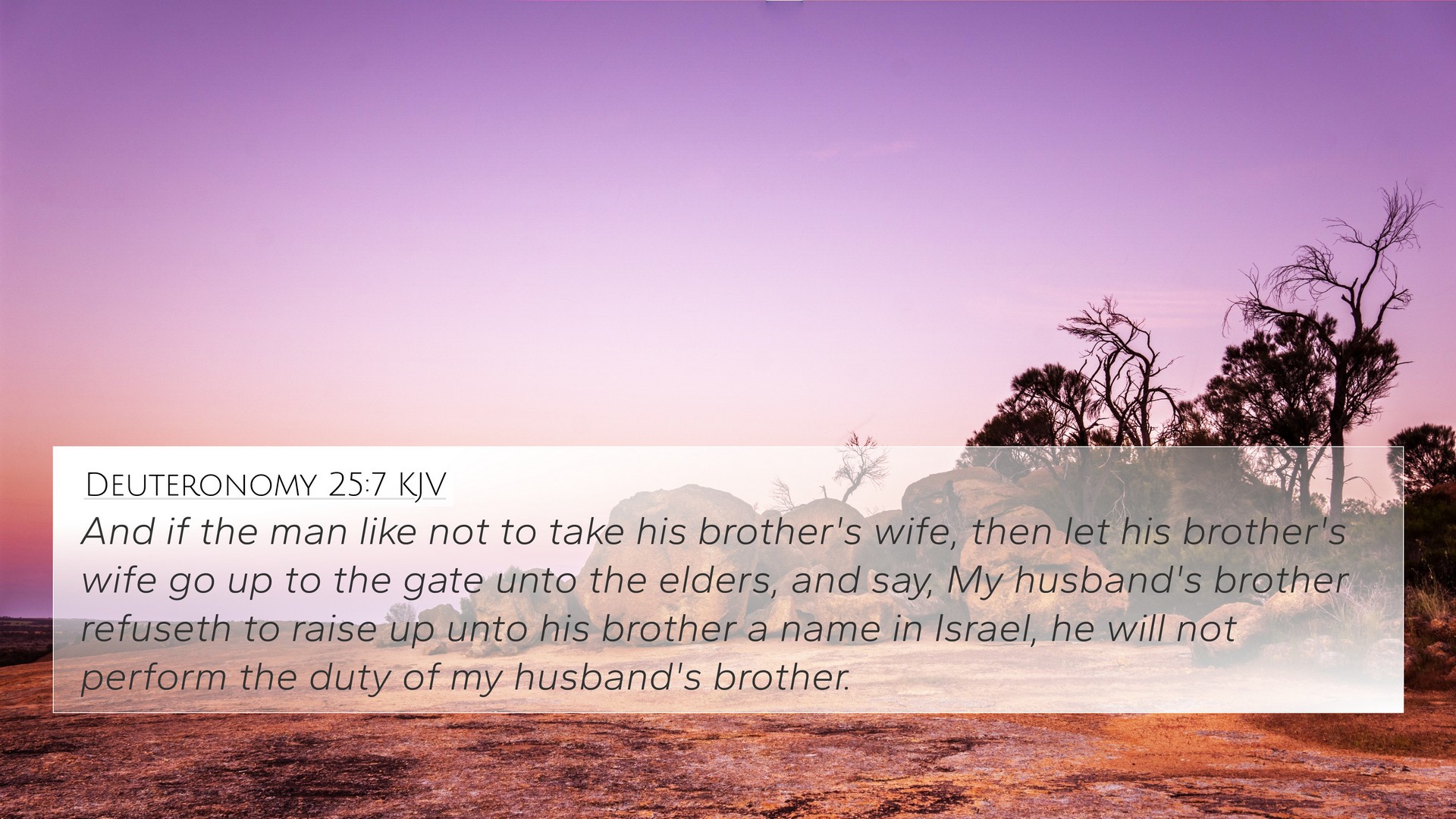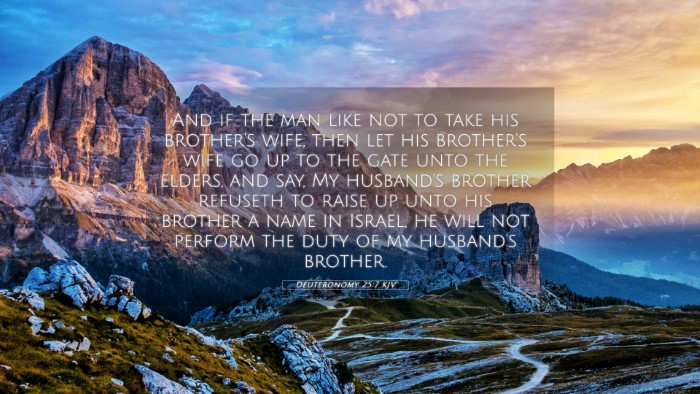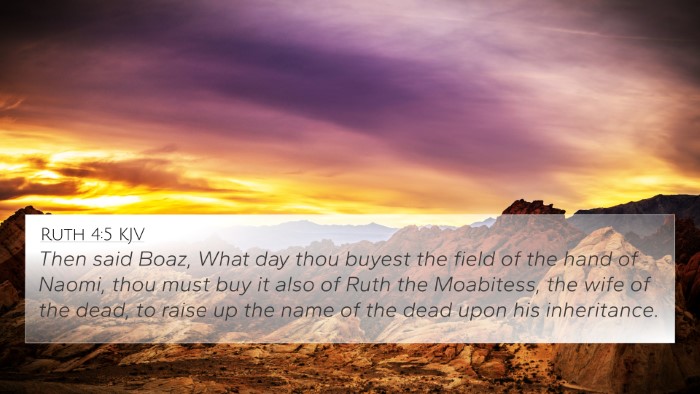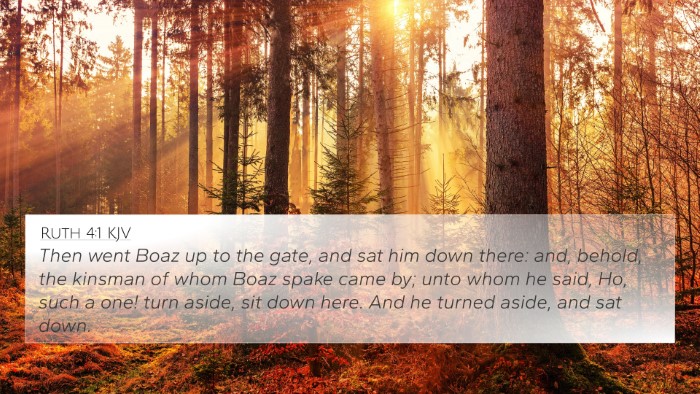Understanding Deuteronomy 25:7
Deuteronomy 25:7 states:
"And if the man does not desire to take his brother's wife, then let his brother's wife go up to the gate to the elders and say, 'My husband's brother refuses to raise up a name to his brother in Israel; he will not perform the duty of a husband's brother to me.'
This verse addresses the important practice of levirate marriage, a custom found in ancient Israel, where a man would marry his deceased brother's widow to preserve the family lineage. This practice reflects the social and familial obligations present in ancient contexts.
Commentary Insights
Commentaries from Matthew Henry, Albert Barnes, and Adam Clarke provide a deeper understanding of the implications and responsibilities reflected in this verse:
-
Matthew Henry's Commentary:
Henry emphasizes the significance of familial duty and how God's laws were intended to protect and maintain family lines. He points out that the refusal of the brother to fulfill this duty is a serious matter, reflecting a disregard for family responsibilities.
-
Albert Barnes' Notes:
Barnes explains the legal aspect of the scenario, indicating that this process was established to avoid the extinction of family names and possessions. He notes the importance of the widow's voice in the community and her right to seek justice.
-
Adam Clarke's Commentary:
Clarke discusses the cultural context of the command, highlighting how these practices were vital for social structure. He provides insights into the character of the levirate law, which not only served as a protective measure for widows but also reinforced the notion of communal responsibility in Israel.
Key Themes and Cross-References
Deuteronomy 25:7 is intertwined with several themes in the Bible relating to family, duty, and societal laws. Below are some notable cross-references:
- Genesis 38:8-10: The story of Onan provides context to levirate marriage, illustrating the importance of raising descendants for a deceased brother.
- Ruth 4:5: Ruth's situation also depicts levirate obligations and how Boaz fulfills the duty of a kinsman-redeemer.
- Matthew 22:24: Jesus references the levirate law when discussing resurrection and marriage, indicating its ongoing relevance.
- Mark 12:19: Similar to Matthew, this passage reiterates the importance of the levirate when speaking of resurrection.
- 1 Corinthians 9:5: Paul refers to the rights of apostles to take wives, hinting on community and family roles.
- Hebrews 11:4: The mention of Abel's faith foreshadows those who would come after and the significance of names in representing legacy.
- Deuteronomy 25:5: Provides the initial command regarding levirate marriages, further framing the context of 25:7.
Understanding the Cultural Practice
The practice of levirate marriage, as emerged from Deuteronomy 25:7, exemplifies God’s concern for social justice and the welfare of women within the patriarchal structure of ancient Israel. It shows a commitment to preserving family lineage and ensuring the support of widows, which is a recurring theme throughout biblical texts.
Theological Implications
This verse transcends its immediate historical context, serving to encapsulate broader theological principles. Key implications include:
-
Family Responsibility: God’s laws emphasize the obligation of family members to care for one another, which reflects the nature of divine community.
-
Justice for Widows: The emphasis placed on the welfare of widows shows God's heart towards the marginalized and vulnerable, a theme pervasive in both the Old and New Testaments.
-
Preservation of Legacy: The levirate marriage law illustrates the significance of maintaining family heritage, a concept mirrored in the genealogies found in the New Testament.
Applying the Lessons Today
Readers of Deuteronomy 25:7 can glean practical lessons for contemporary life, including:
-
Importance of Family: Emphasizing family ties and responsibilities can lead to stronger community bonds.
-
Advocacy for the Vulnerable: It reminds us to advocate for those who are marginalized within society, ensuring their needs are met.
-
Being Rumbling:** Inspires believers to fulfill their responsibilities to one another, echoing the biblical call to love and support each other.
Conclusion
Deuteronomy 25:7, while rooted in ancient cultural practices, presents enduring principles relevant to modern faith. The verses encapsulate themes of community responsibility, justice, and the sacredness of family, inviting believers to reflect on their roles within their families and societies. Through tools like cross-referencing Biblical texts, readers can explore how such verses have been connected throughout the Bible, enriching their understanding of scripture.




